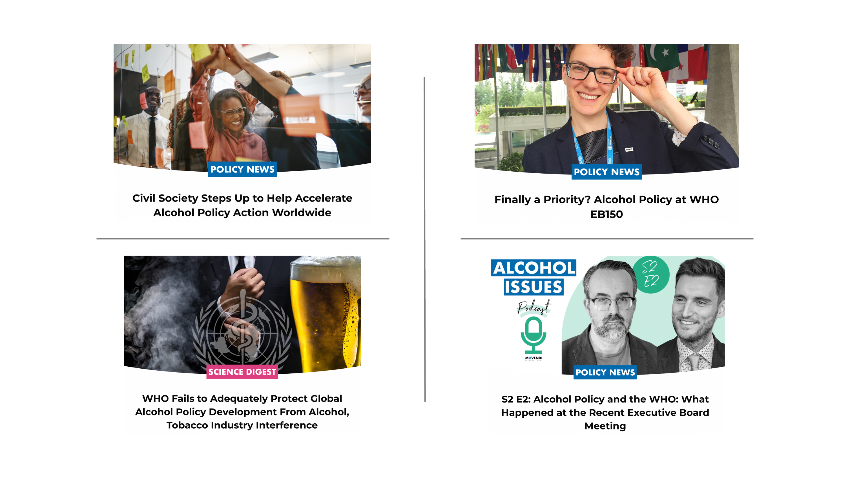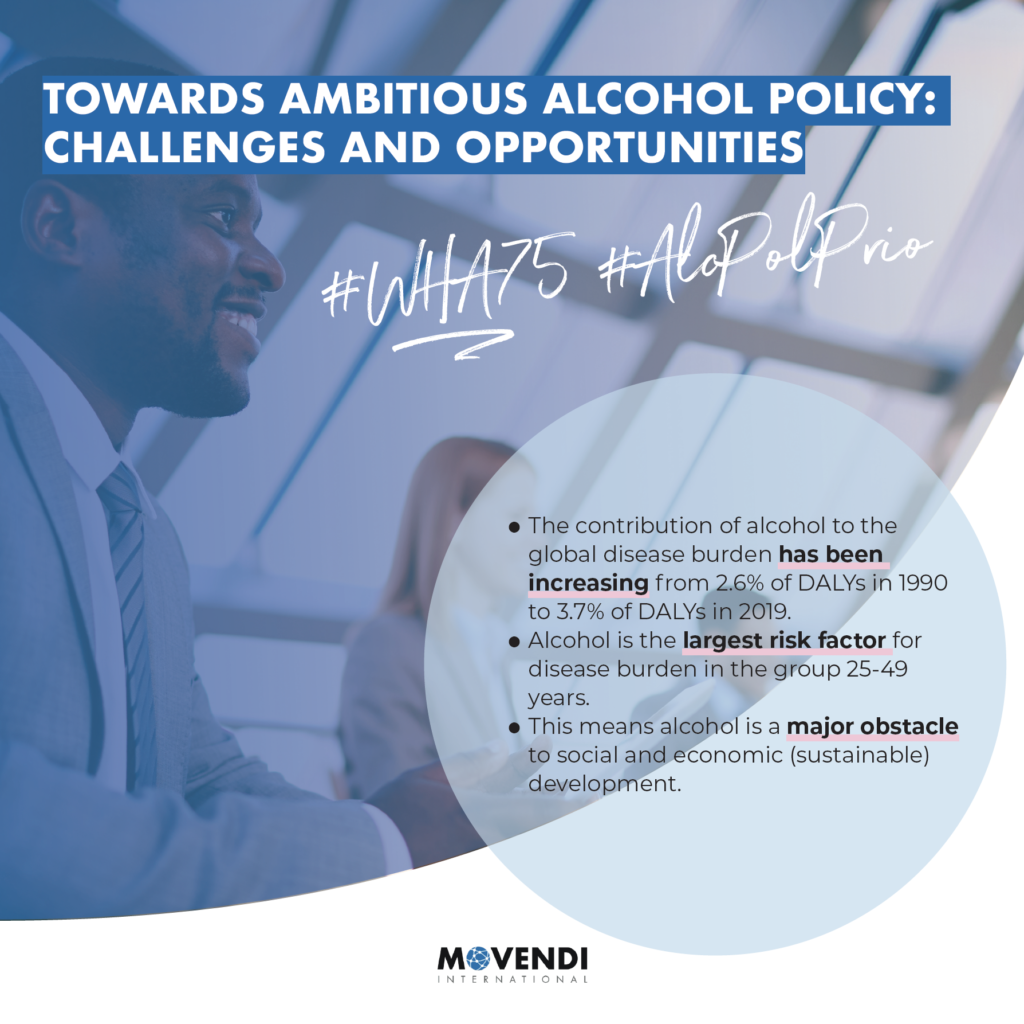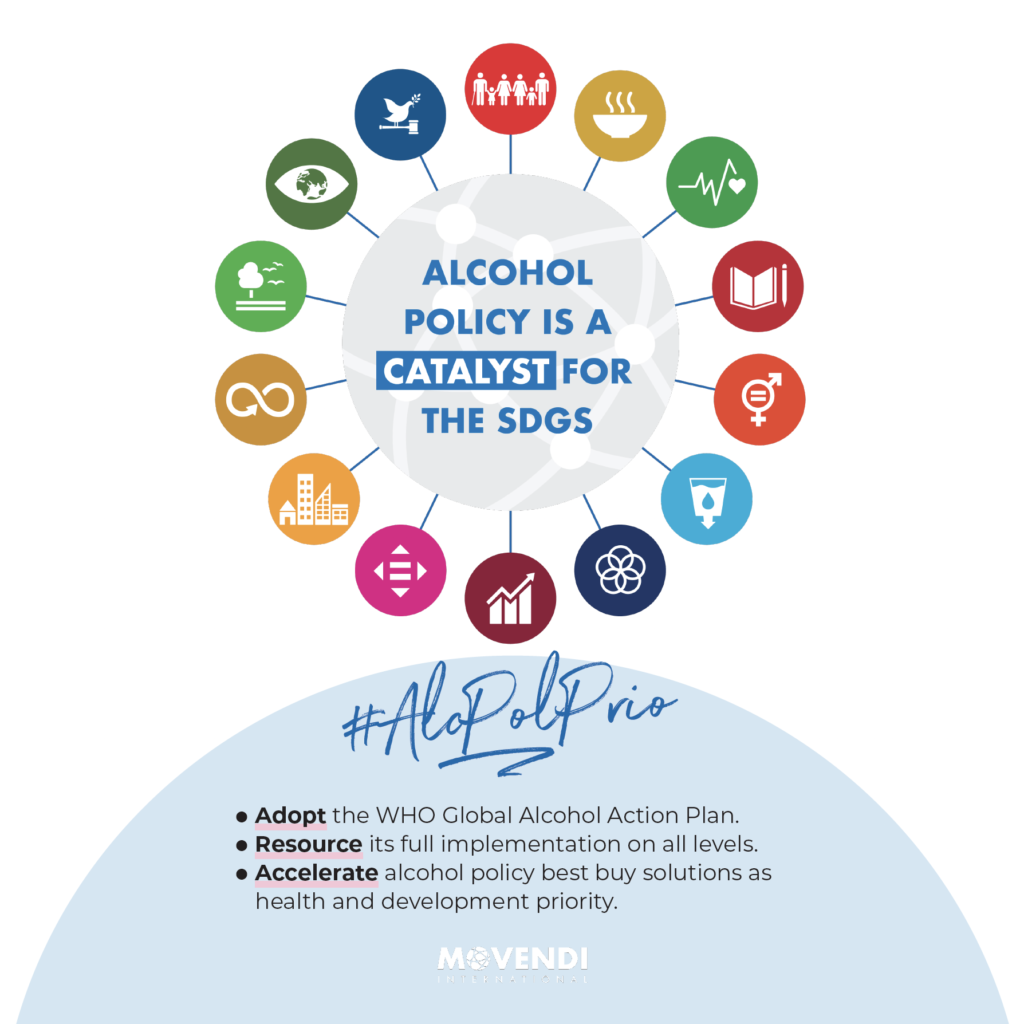The 75th Session of the World Health Assembly is set to be historic for the global response to the harm caused by the alcohol industry. WHA75 is set to adopt the WHO Global Alcohol Action Plan and in doing so, accelerate action on alcohol as public health priority.
During the Seventy-fifth World Health Assembly (WHA75), held in Geneva, Switzerland from May 22 to 28 May, public health leaders from around the world will convene to decide on the World Health Organization’s leadership and vision for the future, and to discuss critical global health issues, including the WHO Global Alcohol Action Plan and how to accelerate action on alcohol as public health priority.
Movendi International is engaging at WHA75 though bilateral and coalition-driven advocacy, including during key events and on social media, as well as by providing key resources. In close partnership with health promotion and NCDs risk factor prevention advocates around the world, including from the NCD Alliance, WCRFI, UICC, World Heart Federation, IFMSA, and International Youth Health Organization, Movendi International will be calling on WHO Member States and the WHO to finally make alcohol policy the priority it should be and to keep public health action on alcohol, front and center during all aspects of WHA75.
We will be closely monitoring discussions, decision, and resolutions on NCDs, health emergencies and pandemic preparedness, universal health coverage (UHC), maternal, infant and young child nutrition, the WHO Implementation Framework for Billion 3, including WHO global strategy for food safety, with the highlight being the WHA75 discussion and adoption of the WHO Global Alcohol Action, under the NCDs agenda item.
Our official statement
Movendi International, through its Official Relationship Status with the WHO, will address the World Health Assembly through statements and support other civil society statements during discussions on key agenda items.
Our official statement on the Global Alcohol Action Plan (Agenda item 14.1.3 [h]) is supported by the NCD Alliance, International Youth Health Organization, and the International Federation of Medical Students’ Associations.
Our job is to make alcohol policy the priority it should be, in all areas of public and global health, where the products and practices of the alcohol industry cause harm and impede progress. And our job is to support Member States to accelerate action on alcohol harm, by adopting the Global Alcohol Action Plan and ensuring its full implementation.
Movendi International partners with governments from eleven countries to co-host a high-level side event on alcohol policy.
Key advocacy asks
In short
The ten years since the adoption of the WHO Global Alcohol Strategy in 2010 must be considered a lost decade for alcohol policy development.
But in 2019 and 2020 WHO Member States recognized this. Alcohol is the second largest risk factor for disease burden in the age group 10-24 years. And alcohol is the largest risk factor for disease burden in the group 25-49 years. This means alcohol is a major obstacle to social and economic (sustainable) development.
In recognising the growing alcohol burden and the lack of progress over the past decade, Member States entered into an extensive consultation process on global and regional levels of more than two years to find solutions for how to accelerate action on alcohol as public health priority.
In this process a delicate consensus emerged that yielded a carefully crafted compromise document – the Global Alcohol Action Plan, endorsed by EB150 and recommended for adoption at the WHA75.
At the World Health Assembly, we recommend to focus on adoption of the Global Alcohol Action Plan and direct attention to its full implementation, adequate resourcing, alcohol policy infrastructure improvements, conflict of interest protections, and regular review and reporting of progress.
Join us in calling on governments
- It’s time to accelerate action on alcohol as public health priority and the new action plan holds significant potential.
- Movendi International welcomes and endorses the WHO Global Alcohol Action Plan (GAAP) and urges its full implementation.
Important considerations for the way forward, as the focus turns to implementation of the GAAP:
- Adequately resource the implementation of the action plan, including on community level;
- Ensure biannual review of GAAP implementation and progress at the WHO governing bodies, and more regular and frequent status reports from the WHO Secretariat;
- Launch an inter-agency initiative for public health alcohol taxes, to enhance technical capacity and uptake of the single most cost-effective alcohol policy solution, to foster leadership, and to advance cross-border collaboration; and
- Take concrete steps to protect alcohol policy development from alcohol industry interference and to safeguard against conflicts of interest, for example through technical tools development.
The potential of the WHO Global Alcohol Action Plan at a glance
The WHO Global Alcohol Action Plan (GAAP) is a delicate compromise document that respects the red lines of major alcohol producing countries (especially in the EU) and the request of alcohol policy champion countries for more ambitious, evidence-based action to protect people and communities from the harm caused by the products and practices of the alcohol industry.
There are concerning elements in the GAAP that need to be overcome during its implementation phase, but that risk impeding full implementation and hindering significant progress in the coming years.
Importantly, the Action Plan’s ambitious targets, its focus on the alcohol policy best buys and SAFER, and the improvements to the alcohol policy infrastructure at all levels are promising elements to accelerate alcohol policy action as public health priority.
| Concerning elements in the GAAP | Promising elements in the GAAP |
| Role of the alcohol industry in the document and inclusion of alcohol industry with “measures” in every action area | Ambitious targets – For example: 20% reduction of per capita alcohol consumption |
| The WHO dialogue with the alcohol industry | Ambitious action areas (6 action areas with solid actions for member states and the secretariat) – Clarity on governments’ responsibility to protect people from alcohol harm |
| Flawed concept of “harmful use of alcohol” | Focus on the alcohol policy best buys and SAFER – Closest the GAAP comes to provide a blue print for governments on what to do to accelerate alcohol policy action |
| Suggestion of self- and co-regulation | Operational principles – Among others a human rights based approach to alcohol policy |
| Ability of alcohol and tobacco industry front groups to water down the GAAP | Expert committee with the remit to explore the way forward that could/ should lead to discussions of a global binding treaty in years to come |
| Improvements of the alcohol policy infrastructure at all levels – GAAP contains solid suggestions for infrastructure and governance improvements in global, regional, and national alcohol policy arenas |
From lost decade for alcohol policy to public health priority
Overall, trends in alcohol consumption, alcohol’s contribution to the global burden of disease, and progress towards global targets are all pointing the wrong direction.
The decade after the adoption of the WHO Global Alcohol Strategy in 2010 has not yielded significant progress in the development and implementation of alcohol policy solutions and reductions in alcohol harms.
Alcohol remains one of the leading risk factors contributing to the global burden of disease. It is the eight leading preventable risk factor of disease. The contribution of alcohol to the global disease burden has been increasing from 2.6% of DALYs* in 1990 to 3.7% of DALYs in 2019.
In high income countries alcohol use is the second fasted growing risk factor and in LMICs it is the fourth fastest rising risk factor for the global disease burden.
Alcohol is the second largest risk factor for disease burden in the age group 10-24 years. Alcohol is the largest risk factor for disease burden in the group 25-49 years.
Modelling forecasts that global targets to reduce alcohol use and harm will not be met.
Lack of progress and failure to implement high-impact alcohol policy solutions
Evidence shows that alcohol policy development has been ineffective over the past decade of the WHO Global Alcohol Strategy. For example, technical support to governments has been inadequate, and concrete technical tools have still not been developed. The WHO Secretariat has not allocated adequate resources for the work on alcohol harm. Efforts to protect country initiatives for alcohol policy development have also been inadequate, so that the alcohol industry could interfere, delay and derail such initiatives.
With some notable exceptions, most countries have failed to develop public health oriented alcohol policy solutions in the last decade.
Overall, trends in alcohol consumption, alcohol’s contribution to the global burden of disease, and progress towards global targets are all pointing the wrong direction.
- Without action, Africa could see an increase in both the absolute number and proportion of people consuming alcohol, the amount consumed per capita and heavy episodic alcohol use.
- Southeast Asia has seen a 29% increase in per capita alcohol use since 2010.
- Out of 51 countries in the WHO European Region, only 16 reached the target of a 10% reduction of overall alcohol consumption between 2010-19. But 17 countries saw increases in alcohol use. Almost no progress was achieved since 2016 in the implementation of Best Buys alcohol policy solutions.
- Alcohol remains highly affordable in the WHO Americas region. Between 2012-16, per capita consumption among alcohol users only increased, with 1 in 5 alcohol users consuming heavily.
- Progress in the formulation and implementation of national and local alcohol policy solutions has been insufficient.
- Most countries, especially low- and middle-income countries (LMICs), have NOT implemented a comprehensive set of alcohol policies.
- No low-income country has reported increasing resources for implementing alcohol policy in the last decade.
- Many countries are failing to implement the alcohol policy best buy solutions, with LMICs more likely to have fewer evidence-based and cost-effective policies.
Alcohol affordability
- 95% of reporting countries implement alcohol excise taxes.
- Few use such taxes as a public health policy to reduce consumption.
- Less than half use price strategies such as adjusting taxes to keep up with inflation and income levels, imposing minimum pricing policies, or banning selling below cost or volume discounts.
Alcohol availability
- Less than one-third of countries have regulations on outlet density and days of alcohol sale.
- Some countries, mainly LMICs in Africa, still have no legal minimum purchase age.
Alcohol marketing
- Most countries have some policies on alcohol advertising.
- Alcohol marketing regulation continues to lag behind technological innovations and e-commerce, including rapidly developing new delivery systems.
- Most of the countries that reported no restrictions across all media types were located in the African or Americas regions.
Translating commitment into accelerated action
At the World Health Organization (WHO) Executive Board meeting in February 2020, Member States, called for accelerated action on alcohol as a public health priority. A decision was adopted by unanimous consent (EB 146), requesting the WHO and its director-general to develop an action plan (2022-2030) to effectively implement the WHOs Global Alcohol Strategy as a public health priority.
Since then, WHO has conducted an extensive consultation process lasting two years, to develop the global alcohol action plan to accelerate alcohol policy development and implementation as public health priority – an urgent need according to WHO Member States. The consultation process included global and regional engagements with Member States, one informal meeting and web-based consultation with civil society and academia, and – controversially – also the alcohol industry, despite their fundamental conflict of interest.
In 2022, the 150th Session of the World Health Organization’s Executive Board (EB150) reiterated that alcohol harm is a public health priority and that accelerated alcohol policy action has strong support from WHO Member States.
More than 100 countries were represented by 27 statements made during the debate.
After two years of consultation and negotiation of the draft action plan, the WHO Secretariat’s proposal for a global alcohol action plan won the unanimous approval from the Board to recommend to the 75th World Health Assembly (WHA75) in May 2022 to adopt the draft global alcohol action plan and accelerate the implementation of the WHO Global Alcohol Strategy.
Key resources and tools for advocacy
Together we are making alcohol policy the priority it should be and accelerate action: for better protection of people and communities from the harm caused by Big Alcohol; and for reaching health and development for all through alcohol policy solutions.
For social media activity and government outreach, use these assets:
For key talking points use our official statement:
This statement is supported by NCD Alliance, International Youth Health Organization, and International Federation of Medical Students Associations (IFMSA):
Millions of communities are concerned about the harm caused by the alcohol industry daily, worldwide.
That’s why we endorse the Global Alcohol Action Plan.
We call on Member States and WHO to:
Adequately resource full implementation of the Action Plan, including at community level, Ensure biannual review of progress at the WHA, Launch a global initiative for alcohol taxation, and Develop guidance to protect alcohol policy from industry interference…”
Kristina Sperkova, Movendi International Statement at WHA75
Access key resources about the WHO Global Alcohol Action Plan, about analysis of the lost decade in alcohol policy over the past ten years, and about the way forward:
Click the picture, or here, to access the resource page, providing podcasts, stories, and science digests.







